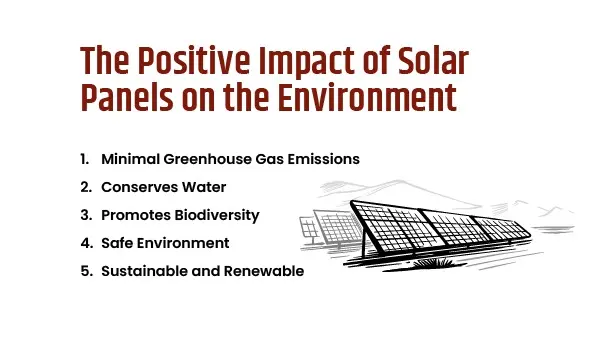The Positive and Negative Environmental Impacts of Solar Panels
Solar panels have become the trend and a very feasible one at that. Not only are they a reliable source of energy, but they are also very clean and sustainable. Solar panels play an important role in reducing carbon footprints to a great extent. And to top that off, they also help minimise the use of harmful fossil fuels. There's no reason you shouldn't install this cost-effective and eco-friendly technology at your home or business! By harnessing energy without using harmful chemicals, gases, and fossil fuels, solar panels prove to be a cleaner and more sustainable alternative to traditional energy sources.
But just like any technology, these have a few drawbacks, too. Let us study in depth both the advantages and the disadvantages of solar panels. And also what impacts they have on the environment.
What are Solar Panels?
Let us look into what solar panels are before we go ahead to their advantages and disadvantages. Solar panels are simply instruments that convert sunlight into electricity through solar cells. This is the Photovoltaic (PV) Effect. Electricity thus generated from the solar panels is utilized in various daily operations such as water heating, powering appliances, outdoor solar lighting, etc.
The Working of a Solar Panel System
Let's take a look at how solar panels work.
- The photovoltaic cells, that are presented in the solar panels, absorb the sunlight.
- As the photons from the sunlight react with electrons they begin moving.
- The motion generates a direct current (DC) that passes through the wiring of the panel.
- But this direct current cannot be used by homes, so it is directed to the inverter. It converts it to alternating current (AC).
- AC power then supplies the electricity to your home or enterprise.
The Positive Impact of Solar Panels on the Environment

Let's focus on the several reasons why solar panels are beneficial. And what positive impacts they have on the environment.
1. Minimal Greenhouse Gas Emissions
Solar panels are the cleanest energy sources, their use won't contribute to greenhouse emissions. Solar panels are safe for the environment considering their many benefits. This will also lead to the betterment of the future.
2. Conserves Water
In contrast to conventional power plants, the best solar panels do not consume a huge amount of water for their functioning to generate electricity. This assists in conserving water for more important purposes.
3. Promotes Biodiversity
As solar panels reduce pollution and global warming, this, in turn, helps the habitat and species from the harmful effects of environmental degradation.
4. Safe Environment
As solar panels don't emit harmful gases in the environment, installing them brings in a lot of benefits. The environment is safe without the excess use of fossil fuels.
5. Sustainable and Renewable
The sun’s energy, being clean and renewable, doesn't harm the environment and is in abundance! In this way, solar panels prove to be very sustainable for the future.
6. No Land Degradation
To obtain fossil fuels, we need manpower to extract and mine them deep from the earth's surface. This harms the environment, on the other hand, solar panels do not need such extraneous harmful activities.
The Negative Impact of Solar Panels on the Environment
We know by now what benefits installing solar panels can offer, but we shouldn't neglect the harm they might possibly cause to the environment. If not managed properly, they can be a little bit of a problem!
1. Large Space Use for Installation
Solar panels require large areas for installation, which might result in cutting down trees. This might also lead to deforestation and the deportation of the natural habitat living there.
2. Storage and Disposal Problems
Extra energy from solar panels is typically reserved in lithium-ion batteries. The batteries are effective, but once damaged, disposal of the batteries can be an environmental hazard if not well handled.
3. Pollution during Manufacturing
For constructing solar panels, we require a large number of minerals. They are mined or dug out from the earth's surface, which results in water and air pollution.
4. Consumption of Energy during Production
It's not as easy to transport or manufacture solar panels as it seems. They consume energy for their installation, some of which is provided by fossil fuels.
5. Harmful Materials
If solar panels get damaged and are not disposed of properly, they might contain hazardous materials that are threatening. So, mindful disposal of such parts is required.
How Can We Minimize the Negative Impact Of Solar Panels on the Environment?
1. Avoid Installing Solar Panels on Fertile Lands
Since solar panels occupy a huge area for their setup, ensure that they are not placed on lands which are fertile agricultural lands. This protects food production and natural biodiversity.
2. Installation of Solar Panels on Existing Structures
Many people install commercial solar systems on the land, which takes up a lot of space and leads to the cutting down of trees. One can make use of solar rooftop systems for energy use in the home. Even parking spaces can work well for the installation of solar panels.
3. Advanced Batteries for Storing Solar Energy
For storing excess solar energy, there is a great need for creating under-budget, eco-friendly, long-lasting batteries.
4. Use Sustainable Materials for Manufacturing
Rather than digging or extracting raw materials from the earth, use more environmentally friendly and sustainable materials for making solar panels.
5. Use Recyclable Materials
We should encourage manufacturers to use recyclable and reusable materials for the manufacturing of solar panels.
Conclusion
Although there are quite a few negative impacts of solar panels, the positive impacts outweigh them. Technology can never be fully 100% beneficial, there has to be a downside somewhere. Solar panels are still a better and more reliable alternative to fossil fuels and other non-renewable energy sources. Their contribution to the betterment of the environment makes them the best choice.
KLK Ventures strives to install the best solar panels for your homes, offices, and other commercial purposes. Here, you get to have your hands on the best quality solar panels along with supreme services. There is an extensive number of choices available for you. You won't run out of options. If you are looking for sustainability and long-run investments in renewable energy, then you shouldn't hesitate to contact KLK Ventures for the best solar panels.
FAQs
1. Are solar panels really good for the environment?
Yes, solar panels are a blessing to biodiversity due to their green and clean nature. By minimizing the consumption of non-renewable energy sources, you are combining sustainability with efficiency. Both businesses and homes can enjoy this wonderful gift of human innovation.
2. Do solar panels have any downsides for the environment?
Everything comes with its own package of pros and cons. So is the case with solar panels and its drawbacks. The installation process can be quite expensive and demands a good area for its successful implementation. The manufacturing process can also lead to large-scale land clearing.
3. Can solar panels still work when it’s cloudy or during winter?
Well, they work, but not really efficiently. Solar panels obviously work best in good sunlight to generate good energy. Although they don't stop producing electricity on cloudy days, the total productivity does go down.
4. Is there a way to reduce the negative effects of solar panels?
You can minimize the harmful effects of solar panels through the use of green and recyclable materials when they are produced. In the case of installing them, it is possible to use rooftops or vacant spaces, this will help minimize deforestation.
